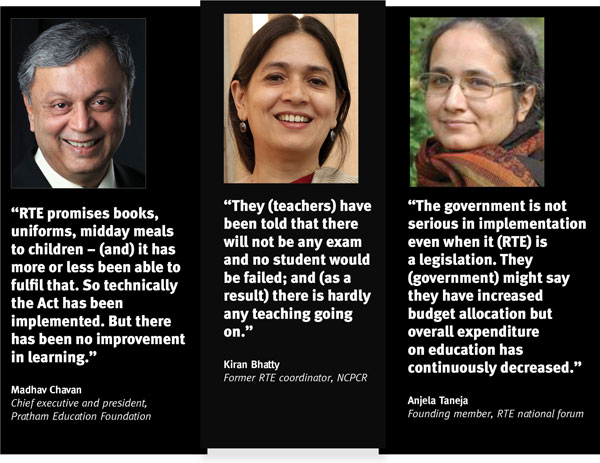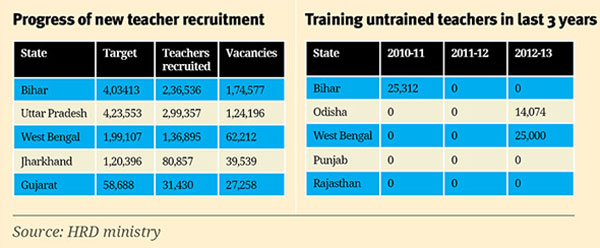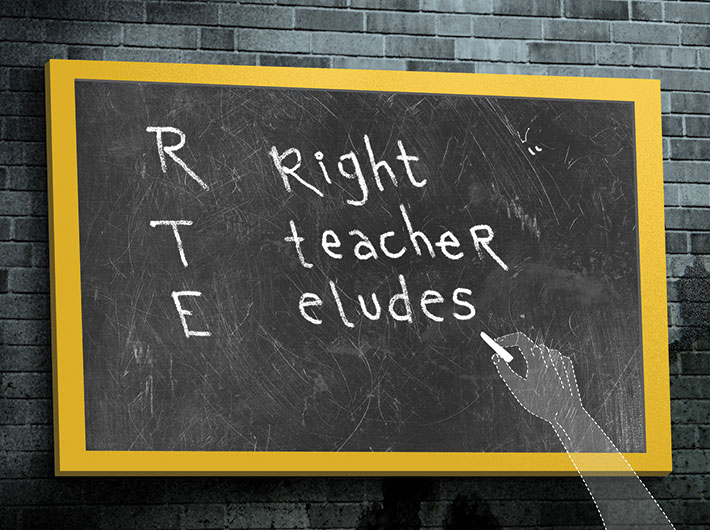At last count, India is 5,04,000 teachers short. With the RTE going fast past the sell-by date, lack of trained teachers and lower learning levels make a mockery of the law. Will the new HRD minister take note?
If the right to education (RTE) is the book, the story is indeed bleak still. Here's the writing on the blackboard: even nearly four years since RTE's implementation, there is a shortage of more than 5 lakh teachers across the country.
Worse, the slide in learning levels among children in rural areas shows little sign of abating.
This, even as the RTE Act has crossed one deadline – March 31, 2013, for infrastructure development in schools and recruitment of teachers – and is just over a year shy of the March 31, 2015 cut-off date for teachers to attain minimum qualifications.
Though a lot has been achieved in meeting the infrastructure parameters set under the RTE Act, appointment of teachers and their placement remains a huge challenge in many states.
Against the target of 19.84 lakh teachers to be recruited, 14.80 lakh were recruited as of September 30, 2013, according to the HRD minister’s reply in Parliament. Over the next one year Bihar alone has to recruit 1,74,577 teachers, while Uttar Pradesh is short of 1,24,196 tutors, the ministry says.
While many teachers have been recruited in the last three years, most of them are not sufficiently qualified. Senior officials at the HRD ministry say the eastern and northeastern states have the maximum shortfall of trained teachers.
In Bihar, 25,000 teachers were trained in 2010-11 but not one teacher has been trained in the last two years, according to government data. In Odisha, no teacher was trained during 2010-12, and only 14,000 trained in 2013. No teacher was trained in the last three years in states like Haryana, Gujarat, Delhi, Punjab and Rajasthan, among others.

For in-service training, financial support is largely provided by the central government under the Sarva Shiksha Abhiyan (SSA), which is the main vehicle for implementation of the RTE Act. A senior HRD official says that apart from distance learning programmes being run by the Indira Gandhi National Open University (IGNOU) with the state governments, the centre has got financial assistance for training 110 teachers in the US. Out of these, 53 have been trained under a three-month programme and 57 more would be sent this year.
“The idea is to create a core group of well-trained teachers who would further train others,” the official says. While the parameters of the first deadline have more or less been achieved, experts believe it would be difficult to achieve the goals set for the next deadline if serious action is not taken. The next one year is seen as crucial for teachers’ education to ensure improvement in the quality of education.
Anjela Taneja, a founding member of the RTE national forum, says there is a large number of unqualified teachers but there is no mechanism in place to train them in the next one year. Specifying that nationally the number of professionally trained regular teachers dipped by a greater margin last year, she says, “I am not sure how the government intends to train this backlog of 21 percent teachers in one year. There are also regional differences. Only 25 percent teachers in Arunachal Pradesh are professionally qualified. Some of the largest states have the biggest backlog – like Assam and Bihar (to name only two examples).”
Taneja argues that even the legal conditions did not force the government to act more responsibly and the government continues to implement the Act through a centrally sponsored scheme – SSA.
“Fundamentally, people have developed aspirations to provide a certain standard of education to their children, which is not unrealistic,” Taneja says. “But the government is not serious in implementation even when it is a legislation. They (government) might say that they have increased the budget allocation but overall expenditure on education has continuously decreased.”
Not learning enough in rural India
Another concern about the implementation of the Act has been the continuous decline in learning levels among children in rural areas. According to the Annual Status of Education Report (ASER) for 2013 prepared by Pratham, a non-profit organisation, the quality of learning in rural schools has remained neglected in the nine years of the UPA government and it has continuously declined since the RTE Act has been implemented.
While the lack of professionally qualified teachers is one reason for this, the ‘no-detention’ and ‘comprehensive and continuous evaluation’ provisions of the Act have also been widely criticised.

Kiran Bhatty, a former RTE coordinator at the national commission for protection of child rights (NCPCR), points out the lack of efficient in-service training to teachers as one of the major reasons for this shortcoming. “Teachers are not given the required in-service training. They are also not trained to understand CCE (continuous and comprehensive evaluation), which is a very complex system in itself,” she says. “They have been told that there will not be any exam and no student would be failed; and (as a result) there is hardly any teaching going on.”
According to the ASER, there has been no significant improvement since last year in children’s ability to read. Nationally, the proportion of children in class III who can read class I-level text increased slightly – to 40.2 percent in 2013 from 38.8 percent in 2012. But this increase came mainly from the improvement of children’s enrolment in private schools.
The proportion of government schoolchildren who are able to read this text remains unchanged from 2012 – it still hovers around 32 percent.
“Many of us call the RTE Act the right to school act,” says Madhav Chavan, chief executive and president of Pratham Education Foundation. “Enrolment has increased; infrastructure has improved, there is a school within walking distance in 99 percent of villages (but) the problem is the declining learning levels.”
According to Chavan, this shows state governments are not playing their role seriously.
“Barring Bihar, where the chief minister has taken a great lead in improving enrolment and is now working on improving the learning levels, no other state government has shown that enthusiasm,” he says. “The centre can give directions but the problem with RTE is that it has too many requirements.”
Chavan says the pressure on a teacher to complete the syllabus is also perhaps the reason behind poor learning levels. “RTE promises books, uniforms, mid-day meals to children – (and) it has more or less been able to fulfil that. So technically the Act has been implemented. But there has been no improvement in learning. And the education expenditure has also decreased over the years.”
So far, RTE has focused mainly on increasing enrolment and providing facilities in schools, which has certainly helped, as figures prove. However, the spirit of the Act is not just to bring children to schools but also ensure that they learn while they grow.
To achieve this, more ground needs to be covered with a stronger political will and greater efforts at all levels. And time is running out.
(This story appeared in the February 16-28, 2014 print issue of the magazine)

